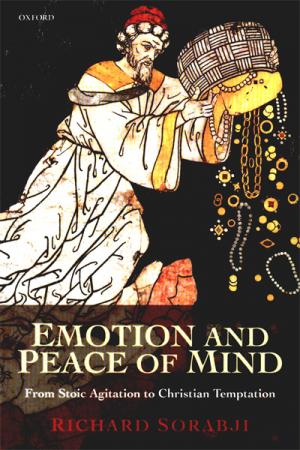Sorabji’s Emotion and Peace of Mind, subtitled From Stoic Agitation to Christian Temptation, traces the historical development of ancient philosophy on emotions, emphasizing the contribution of the Stoics to the debates about what emotion is in general and how to cope with one’s own emotions and establish peace of mind. He examines how the Stoics, including Zeno, Chrysippus and Seneca, reacted to their predecessors and influenced their rivals in the issue of whether emotions are mental judgements and attitudes or if they involve irrational forces, including physical ones. In the last part of the book, he deals with the legacy of the Stoics in the Christian discussion of temptation, especially In Augustine’s thought.
Emotion and Peace of Mind
Books
Emotion and Peace of Mind
1: Emotion as Cognitive and its Therapy
2: The Emotions as Value Judgements in Chrysippus
3: Seneca's Defence Third Movements as Harmonizing Chrysippus and Zeno
4: Seneca's Defence First Movements as Answering Posidonius
5: The Arts First Movements and Controversies on Drama and Music Aristotle Philodemus and the Stoics
6: Posidonius on the Irrational Forces in Emotion Galen's Report
7: Posidonius Judgements Insufficient for Emotion Exhaustion and Lack of Imagination
8: Posidonius Judgements Not Necessary for Emotion Disowned Judgements Animals Music
26: Augustine on Lust and the Will
9: Aspasius and Other Objections to Chrysippus
11: The Role of Analytic Philosophy in Stoic Cognitive Therapy
12: Stoic Indifference: A Barrier to Therapy?
13: The Case for and against Eradication of Emotion
14: The Traditions of Moderation and Eradication
15: How the Ancient Exercises Work
16: Exercises Concerned with Time and the Self
17: Physiology and the Non-Cognitive: Galen's Alternative Approach to Emotion
18: Sex Love and Marriage in Pagan Philosophy and the Use of Catharsis
19: Catharsis and the Classification of Therapies
20: Emotional Conflict and the Divided Self
22: First Movements as Bad Thoughts: Origen and his Legacy
23: From First Movements to the Seven Cardinal Sins: Evagrius
24: First Movements in Augustine: Adaptation and Misunderstanding

In Emotion and Peace of Mind, Sorabji examines how the Stoics developed the idea of emotions as judgements internal to the mind, differing from Platonists, who regarded emotions as rooted in the irrational faculties of the soul. He argues that for ancient philosophers and early Christians alike, philosophical analyses on the human emotions provided useful therapies for emotional disturbance. For the same reason, he expects that the ancient philosophy of emotions will contribute to current strands in psychotherapy and psychology.
- Shin Ahn, University of Edinburgh


